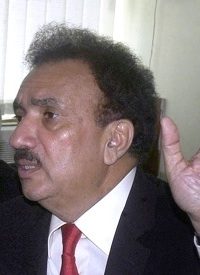
According to UPI on Thursday, May 27, Pakisan’s Interior Minister, Rehman Malik, has made known the results, to date, of his government’s investigation concerning Faisal Shahzad, the Pakistan-American suspect who attempted a failed car bombing in Times Square on Saturday, May 1. According to Mr. Malik, Pakistan is now confirming that Shahzad had connections in that country’s terrorist stronghold area of South Waziristan, “and his accounts are in focus for investigation.” He added that they intend to continue following these leads. Pakistani officials also have two individuals under questioning who are suspected of escorting Shahzad to Waziristan for terrorist training.
The tracing of Shahzad and his accomplices if any, have been erratic from the start. Before many hours had passed since the bombing attempt itself, “a Pakistani terrorist group” had tried to take credit. Then American officials began in concert to say that the near-miss in New York City was the act of one “lone wolf.” The Pakistani terrorist group Tehrik-e-Taliban Pakistan (TTP) then denied association with Shahzad, but praised his efforts. Once Mr. Shadzad was captured, about 53 hours after leaving his non-detonating car bomb in Times Square, he evidently began to talk. The tune from American officials by then was changing rapidly, and they now agreed that he could not have been working alone.
Finally the TTP admitted to having been associated with the bomber. Since that time, efforts have generally been made to look into Shahzad’s background, tracing everything connected with him in order to find out how he was financed, trained, assisted, and even radicalized into terrorism.
Around 15 suspects have been kept in connection with the Times Square attempt, both here and in Pakistan, including Faisal Shahzad himself. It turns out he had been on one or another U.S. government watch list since about 1999. He almost made it out of New York City after the bombing, authorities having once lost track of him, before his name was spotted as a passenger just before the Dubai flight he had boarded taxied for the runway at JFK airport.
Meanwhile, the New York Times ran an article on Tuesday, May 25, concerning what the citizens in Pakistan are thinking about it all. It turns out that the “conspiracy theory” of an evil American “think tank” is well believed by many there:
“They have planted this character Faisal Shahzad to implement their script,” said Hashmat Ali Habib, a lawyer and a member of the bar association.
Who are “they”?
“You must know, you are from America,” he said smiling. “My advice for the American nation is, get free of these think tanks.”
The suspicion of America in this manner is deep and real with many Pakistanis, extending beyond just politics and even to what can go wrong in common, everyday life there. Though this has a bit of a humorous aspect to it at times, the inherent distrust that is chacteristic of its citizens serves to explain why the Pakistan relationship with the U.S. is shaky and has not firmly moved forward. With American officials coming and going into Pakistan — often in secret, and for purposes not always made known — its citizens harbor a heightened sense of alarm and skepticism concerning what is actually afoot.
Photo: Pakistan’s Interior Minister Rehman Malik: AP Images



